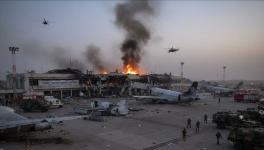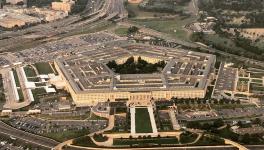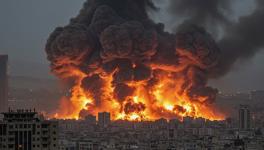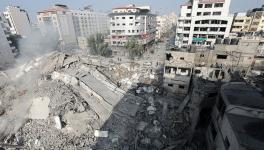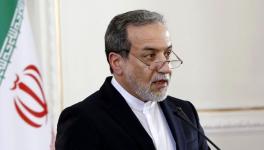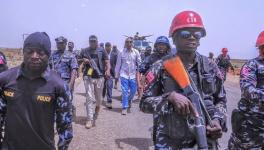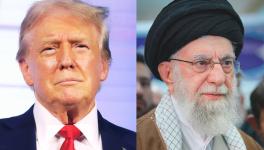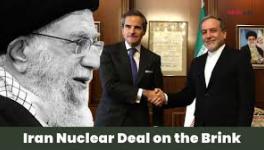A Kurdish Nation Amid Fear, Sanctions and Opposition
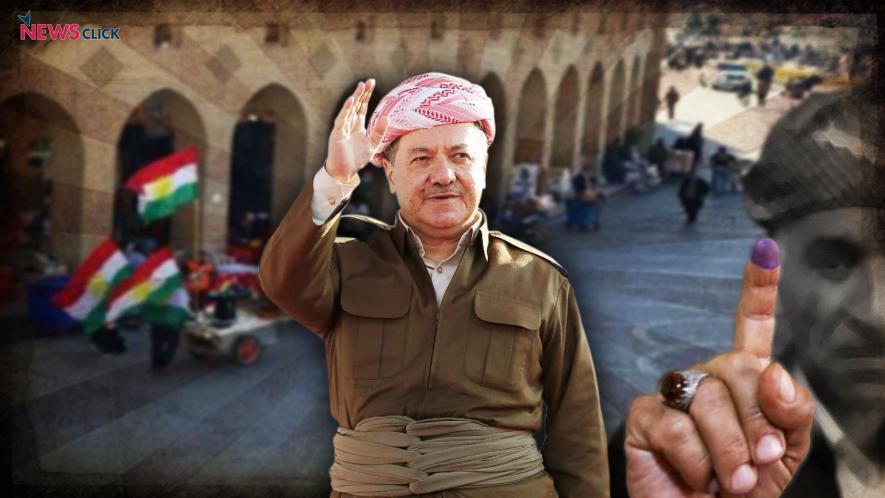
Newsclick Image by Nitesh Kumar
Masoud Barzani, President of the Iraqi Kurdistan, delivered a televised speech Tuesday night declaring victory for the ‘Yes’ vote — a day after the referendum was held to carve out a Kurd nation from the country.
The Kurdish referendum, held in the northern autonomous part of Iraq despite opposition from all of the neighbours, including Iraq, is yet another highlight of the overall procrastinated conflict in West Asia — which many argue will end up further disintegrated after this development.
Barzani, fronting as a ‘champion’ of the Kurdistan cause, offered dialogue and negotiation to Baghdad and other neighbours in response to their firm opposition to the move that they claim will plunge the whole region further into chaos and instability.
The Kurdish Regional Government (KRG) led by Barzani was threatened by Baghdad, Ankara and Tehran with sanctions, but that did not concern him much as he continued to thank his voters for participating in the referendum.
Barzani, however, has shared that a win would not result in an automatic declaration of independence, but would lead to negotiations with Baghdad.
The Kurdistan region’s Independent High Elections and Referendum Commission (IHERC) said the turnout was 72.16%. More than 3.3 million people, out of an electorate of more than 4.5 million, took part in the decisive vote.
Iraqi Kurdistan, rich in oil reserves, often accuses Baghdad of violating agreements on oil revenues.
The concerns of the fallouts post-referendum were voiced by the UN Secretary-General Antonio Guterres, who pointed out that this act in defiance of the international community could have “potentially destabilizing effects”.
These effects — according to US, Iran, Turkey and Baghdad — include distracting the allied forces in fighting the Islamic State (IS) militants in the country and the region.
Kurds living in Iran reportedly celebrated the vote amid Tehran’s military drill as they closed their border with the Kurdish region on Baghdad’s request.
Iran and Turkey also closed their airspace to Iraq on Sunday. Tehran earlier termed the independence referendum as “untimely and wrong” as they expressed concern over the fate of Kurdish people living within its own borders and those living in Turkey and Syria.
Together with Iran and Iraq, Turkey has also agreed to consider counter-measures against Kurdistan’s creation.
Prior to the referendum, ministers from all the three nations met and voiced apprehensions over this vote leading to further conflicts in the region, already marred with multiple conflicts.
As a counter-measure, Turkey’s Recep Tayyib Erdogan threatened to interrupt the pipeline that transports oil from northern Iraq to the outside world. The embargo would effect KRG to a significant extent if Ankara persists on the economic blockade.
Turkey has been battling Kurdish insurgency since decades, however the Kurdish outfit PKK in the country has claimed that their aspirations do not include secession.
Ankara has also been battling a possible political and military cooperation between Turkish Kurds and outfits like the US-backed Syrian Democratic Forces (SDF) and the People’s Protection Units (YPG) fighting in eastern Syria. Their advance in the country has also raised concerns for Turkey, which now appears to be positioning itself closer to Russia. Syrian Kurds, however, have also said that they do not wish to follow the footsteps of Iraqi Kurds.
Russia in a fresh foreign ministry statement said it considers “unity and territorial integrity” of Iraq and other states in the region important and urged to avoid anything that could destabilize the situation in the region.
Kurdish people are the fourth largest ethnic group with nearly 40 million of the estimated population living divided in Iran, Iraq, Syria and Turkey. Their aspiration of a separate state rose after the fall of teh erstwhile Ottoman Empire during World War I. As new nation states were being carved out in the Caliphate’s huge West Asian territory, Kurdistan was never realised.
Get the latest reports & analysis with people's perspective on Protests, movements & deep analytical videos, discussions of the current affairs in your Telegram app. Subscribe to NewsClick's Telegram channel & get Real-Time updates on stories, as they get published on our website.









